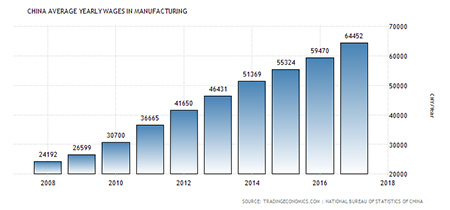Being both an event furniture manufacturer and a special event rental company gives us a unique perspective on the inner workings of our industry.
We are seeing rising costs firsthand from a variety of sources--not only from the U.S.-China tariffs but also across the industry, from raw materials to labor costs and even freight. The aggregate of all these rising costs is beginning to materialize for new event businesses trying to get started as well as for established special event companies looking to add new products to their inventory.
RISING COSTS, RISING HURDLES Though the U.S.-China trade war and tariff discussions are in the news now, it seems that most people do not understand that prices are increasing quickly at the manufacturing level, and that these rising costs will have direct effects on the special event industry moving forward.
Significantly more money will be needed to start or expand a special event business in the future.
The U.S.-China tariffs seem to be the tipping point for price increases and the impetus for manufacturers to reevaluate dwindling profit margins and get to a healthier level.
For the last few years, the price level to buy chiavari chairs and other furnishings has fallen substantially, even though average manufacturing costs in China have risen every year. Many importers and manufacturers of special event furniture in China have been absorbing these cost increases and lowering prices, all due to fierce competition.
The new tariffs implemented by the Trump administration on Chinese imports appear to have become the catalyst for price increases not just on Chinese-made products, but on many other products made outside of China.
Vision Furniture has seen rising costs for many of the items we purchase in the U.S., such as metal parts for our chair carts, resin dollies that are made in the U.S., and cardboard boxes and other packaging material. Even freight costs from FedEx, UPS and LTL [less than truckload] carriers have been on the rise.
It appears that it will be better value to invest in special event products now, before 2019, than it will be going forward, regardless whether the products are made in China or not. Here are some of the reasons:
1) Labor costs in China are on the rise, forcing production prices higher and higher.
The graph below is courtesy of Trading Economics, and represents rising labor costs in manufacturing since 2008 in RMB currency. As you can see, the Average Yearly Wage in RMB in 2008 was 24,192 RMB vs. 64,452 RMB in 2017. This is a 266 percent increase in average manufacturing labor costs over the course of these years. Many of the furniture products in the special event industry come from China, and hence products should be costing more for importers.

2) Tariffs on Chinese goods are forcing prices up.
The Trump administration has approved tariffs for $250 billion of imported goods from China over three separate lists. List Three, which took effect on Sept. 24, adds a 10 percent tariff to almost all furniture items imported from China. Information about these tariffs can be found at the Office of the U.S. Trade Representative website.
Many of the furniture items imported from China, including our chiavari chairs, now have a 10 percent additional import cost since Sept. 24. These tariffs are to increase to 25 percent on Jan. 1., 2019. However, this may change if China and the U.S. make a trade deal prior to Jan. 1.
A 10 percent tariff means special event furniture will cost 10 percent more to import now.
If a 25 percent tariff goes into effect on Jan. 1, this will be a significant and possibly catastrophic burden on the importer. These costs will have to be passed down onto the consumer, leading to a notable cost increase for companies investing in special event furniture coming from China.
As importers of chiavari chairs, we found it unfathomable that we would have a 25 percent duty to finance. Going forward, it is uncertain how the marketplace will handle chiavari chairs and other event furniture that will cost potentially 25 percent more in 2019. Many of the furniture products being imported with the higher duties have yet to hit the retail market, but these higher cost products will be arriving early in 2019.
3) Capacity changes and price increases in domestic shipping are hitting the industry.
We have seen our domestic freight costs increase across the board in 2018. Shipping our chiavari chairs to customers anywhere in the U.S. is costing more this year than it has in the past. Some of our volume truckload carriers do not even have capacity to offer volume service anymore.
The Wall Street Journal reported on Aug. 9 that in 2017, “Transportation costs rose 7 percent for U.S. businesses, far ahead of the 4.2 percent average growth rate over the five years ended in 2017.”
From what we have seen in our business, shipping rates have increased further in 2018, making it costlier to ship and receive products.
4) Rising interest rates will boost costs.
Interest rates have been rising recently owing to the strong economy, and the U.S. Federal Reserve is raising rates according to what they see fit to maintain a healthy economy. As interest rates increase, businesses that rely on debt to service their business will face higher borrowing costs going forward.
5) Low employment rate and increasing wages are coming into play.
According to the U.S. Bureau of Labor Statistics, the unemployment rate declined to a level of 3.7 percent in September 2018, which, according to an article on CNN Business, is a rate that hasn’t been seen since 1969.
The Bureau also reported on Oct. 31 that compensation for private industry workers increased 2.9 percent year over year for September 2018 vs. 2.5 percent year over year ending September 2017.
The tighter labor market and rising labor costs means higher personnel costs for special events industries on average.
CONCLUSION: Due to these cost increases happening simultaneously on a variety of fronts, it appears that it will be more costly to run a special events business with higher personnel costs and higher borrowing costs. Purchasing imported goods as well as domestic goods will cost more. If you can make investments now, you should get better value now rather than later.
Special event businesses will have to deal with tighter bottom lines, raise prices for end-users, and seek out new markets and opportunities for making higher margins. On the brighter side, the robust economy might lead to more business helping to offset these costs.
If you have an established event rental inventory, it might become more cost-effective to repair and maintain old inventory as opposed to replacing with more expensive inventory. Established special event businesses will be better insulated from competition, because it will be much costlier for new start-ups to launch a new event business going forward.
Anthony Tokarchyk is owner and president of Vision Furniture, a manufacturer of wood chiavari chairs and cushions for the special event industry, as well as a regional special event rental company located in Philadelphia.





